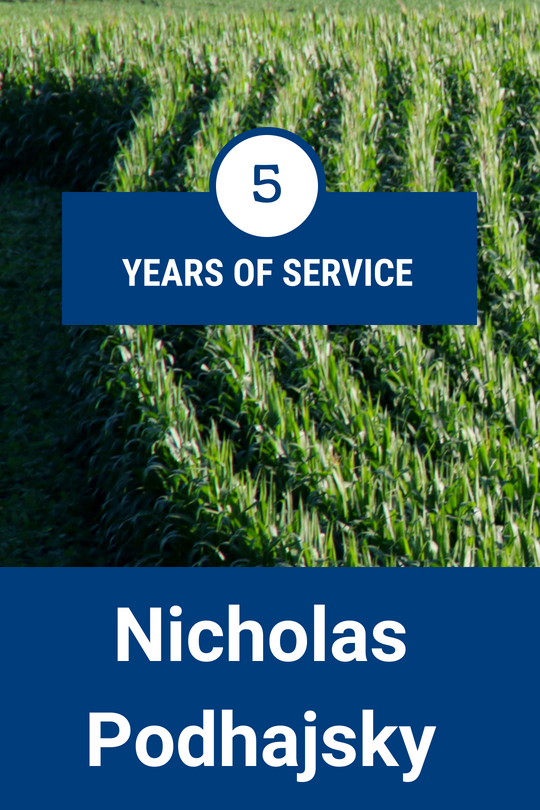All of agriculture is interconnected when it comes to trade, as Nicholas Podhajsky has learned through his involvement with the U.S. Grains Council (USGC) and the Iowa Farm Bureau Federation. The Council recognized Nicholas for five years of service during its 58th Annual Membership Meeting in Denver, Colorado.
“Trade is an absolute necessity for our livelihood and that is the focus of the Council,” said Nicholas, a fifth-generation corn farmer. “When it comes down to it, barley and sorghum may not affect me directly, but indirectly it does. What is good for trade in any of these commodities leaks over to us all.”
Nicholas is no stranger to farmer leadership. Before joining the Council, he was involved in his county farm bureau for more than 20 years. That role led him to join the Iowa Farm Bureau Federation at the state level in 2012, eventually becoming its delegate to the Council. Through these leadership capacities, Nicholas has realized the importance of engaging with organizations like the Council and of individual farmers sharing their stories about how global trade policy issues affect them.
“The best person to represent you is you,” Nicholas said. “If you want to see change, whether your town is the size of St. Louis or Traer, Iowa, you have to be involved.”
Nicholas’s conversations with other Council members, particularly through the Trade Policy Advisory Team (A-Team), have expanded his view on trade. Nicholas believes it is especially beneficial for farmers and agribusinesses to work together on A-Teams to learn about the unique circumstances faced by each group.
Nicholas said he is excited about the Council’s work to develop innovative export markets around the world and that his Council involvement has given him a greater appreciation for the process of opening new markets for U.S. farmers and agribusinesses.
“A few chickens or pounds of meat per person may not seem like a big deal until you have a few hundred million people,” Nicholas said. “It is all a part of the big wheel of improving people’s lifestyles and quality of life across the globe.”
For Nicholas, working with other industry professionals has emphasized the importance of collaboration between all sectors to expand export market demand for U.S. coarse grains and co-products.
“I appreciate how we can all work together across commodities for the general good of agriculture,” Nicholas said. “Working with the Council allows everyone in the grain industry to work together. We all have to be pulling in the same direction if we ever want to get what we want.”
About The U.S. Grains Council
The U.S. Grains Council develops export markets for U.S. barley, corn, sorghum and related products including distiller’s dried grains with solubles (DDGS) and ethanol. With full-time presence in 28 locations, the Council operates programs in more than 50 countries and the European Union. The Council believes exports are vital to global economic development and to U.S. agriculture’s profitability. Detailed information about the Council and its programs is online at www.grains.org.

